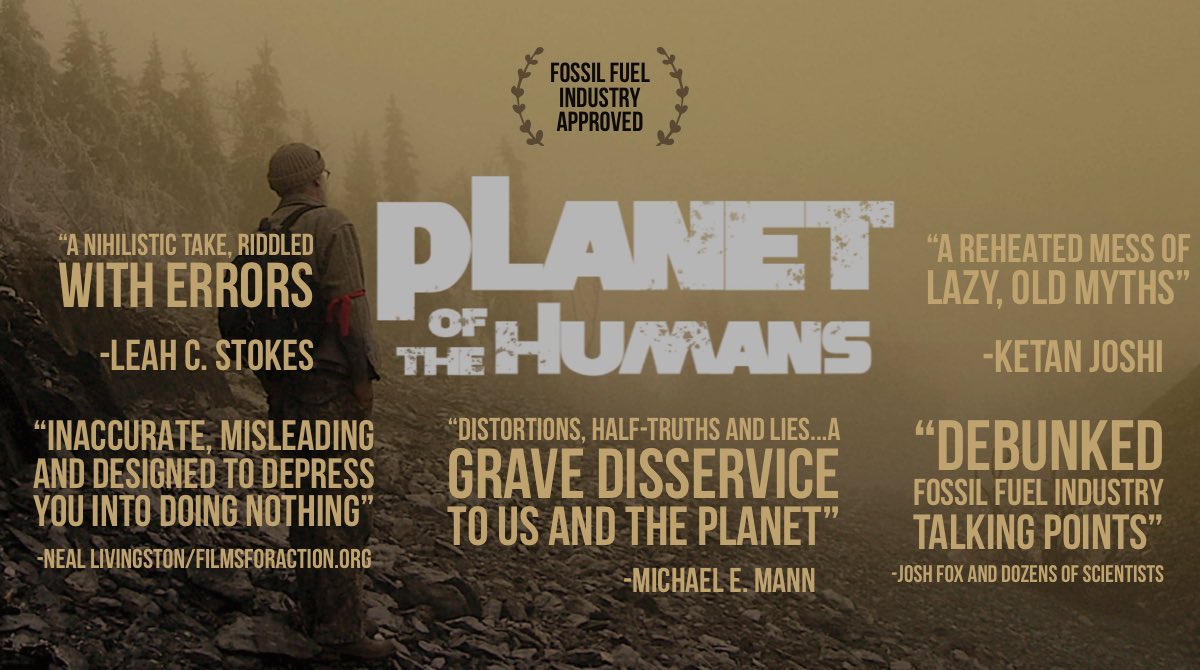- Joined
- Dec 11, 2018
- Messages
- 1,185
- Trophies
- 0
Let’s say you want to make a documentary about a complex and important topic. You could spend a lot of time on research—developing a complete picture of things, identifying scientists to interview, and figuring out how to give viewers the context necessary to understand the most nuanced issues. Or, you could just go point your camera at stuff until you have an hour and 40 minutes of footage, lay down a voiceover, upload that baby to YouTube, and call it a day.
Planet of the Humans, a documentary made by Jeff Gibbs and Michael Moore, falls into the latter category.
The topic of the film—released on YouTube just before Earth Day to throw shade on what it views as a corporate takeover of the day—is green energy. But if you’re thinking you might learn something about green energy from a film-length treatment of the topic, think again. The basic formula is this: Gibbs reveals that he once thought renewable sources of energy were fairy-dust perfect, with no environmental impact of any kind, but he learns that there is some impact and so declares that they are as bad as or worse than fossil fuels.
There is an entire field of science dedicated to what is called “Life Cycle Analysis”—estimating the cradle-to-grave impacts of mining for, manufacturing, using, and disposing of things like solar panels or electric vehicles. That science makes exactly zero appearances in Planet of the Humans. Instead, we are treated to a series of “revelations” that most people should be well aware of. Fossil fuels are still used to manufacture and bring us wind turbines! Raw materials are mined to make electric vehicle batteries! Solar panels don’t last forever and are eventually replaced! Although Tesla says its Gigafactory is generating renewable electricity to cover 100 percent of usage, it’s connected to the grid by power lines!
Demonstrably false claims come fast and furious. It’s said multiple times that fossil fuel plants have to “idle” all day to ramp up when solar or wind dips and that this is worse than simply running the fossil fuel plant all day instead. We’re similarly told that using grid storage batteries to smooth out supply from increased renewables makes things worse rather than better (because of battery manufacturing). And hydrogen? That can only be produced from petroleum, we learn, as if splitting water wasn’t the main argument for expanding hydrogen use.
No math is done at any point, no data is shown for grid-total emissions over time, and no scientists are consulted to quantify emissions or compare different scenarios. Some of the information presented comes from Gibbs’ strategy of plying industry trade-show sales reps and environmental advocates with awkward questions on camera, then stringing together quick-cut clips of people admitting to downsides. The rest comes from Ozzie Zehner—an author of a book critical of renewable energy titled Green Illusions—who is also listed as producer of the film. Zehner is mostly used to explain how raw materials used in green tech are produced, making claims like “You use more fossil fuels to do this than you’re getting benefit from it.”
That’s false. Really, really false. As you’d expect, solar and wind installations produce many times more energy over their lifetimes than was used to produce them, breaking even in a few months to a few years. And that means the lifetime emissions associated with these forms of generations are far, far less than for a gas or coal plant.
Planet of the Humans is an example of the way the ends of the political spectrum can sometimes wrap around and meet, because many of these same arguments are more commonly found on websites like Breitbart or Natural News. (Praise for the film has already appeared at Breitbart.) Those who reject climate science are eager to scoff at renewable energy with supposed proof that it’s all a scam. The motives here are obviously very different, but the tactic is the same.
Given all this, you might wonder what Planet of the Humans presents as the right solution. If you watch it, you’ll still be wondering that at the end. It offers this: “We humans must expect that infinite growth on a finite planet is suicide.” OK... then what? Only two things are called out—human population must be smaller and individual consumption of goods and energy must decrease.
The focus of some Western environmentalists on population growth is problematic in ways that cannot be ignored. Population growth today is primarily driven by developing regions including India and African nations. A wealthy, white American consumes vastly more resources than these people—when Gibbs describes population growth as a problem that has to stop, the message doesn’t sound entirely beneficent to the developing world. And while it’s true that population growth tends to level off with increasing wealth and women’s rights—the most commonly suggested goals—it’s hard to make a message of shrinking the human population sound empathetic.
But even setting that aside, these vague solutions don’t do anything that the film’s logic hasn’t already rejected. Green energy is supposedly no solution at all because its environmental footprint is greater than zero. In a hypothetical world where there are many fewer humans on Earth and each one consumes much less, the environmental footprint of humans is still greater than zero. Why is reducing our footprint through cleaner technology a lie and a scam, while reducing our footprint by shrinking population and consumption the truth we must all accept? The film offers no justification.
The film’s argument doesn’t go anywhere because it has nowhere to go. It’s fundamentally not about a path forward or a vision of a better future. It seems more like a long “I told you so.” Multiple speakers tell us that industrial civilization cannot devise a solution because industrial civilization is the problem. Working from that axiom, green energy can’t possibly be good, because industries can make money doing it. Exposing the “scam” of industrial green energy is just a defeatist victory lap.

Michael Moore’s green energy takedown—worse than Netflix’s Goop series?
Planet of the Humans is deeply useless. Watch anything else.

'A Bomb in the Center of the Climate Movement': Michael Moore Damages Our Most Important Goal
The battle to slow down global warming in the short time that physics allots us it requires ever bigger movements, not showmen.

Meet the New Flack for Oil and Gas: Michael Moore
Planet of the Humans is wildly unscientific, outdated, full of falsehoods, and benefits fossil fuel industry promoters and climate deniers.
 www.thenation.com
www.thenation.com

Moore’s Boorish Planet of The Humans: An Annotated Collection
For Earth Day 2020, Michael Moore announced 30 days of YouTube access of the Jeff Gibbs written/directed and Michael Moore ‘executive produced’ Planet of the Humans. This free mass rele…
getenergysmartnow.com